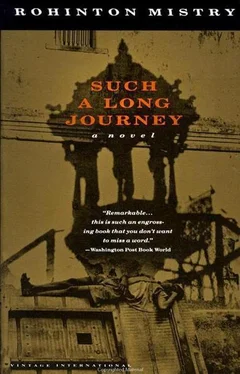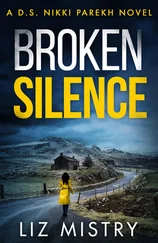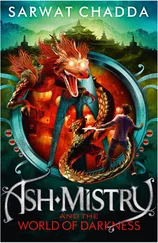She blocked his way. ‘Calm down a little. That man is a crackpot, why are you being like him?’
‘I am telling you, open the door and move aside!’
‘But how will we pay next month’s bill without these?’
‘That’s OK, we will stop the papers! Every morning brings nothing but bad news, anyway.’
She gave up and let him pass. His teeth were clenched tight. The weight under his arms hampered him, making him limp more than usual. Tehmul hurried over to help. ‘GustadGustad. Pleasepleaseplease. Iwillcarrythankyoupleaseverymuch.’
‘Shut up and get lost!’ he said without looking at him.
Tehmul froze. Not till Gustad entered the building at the other end did he dare move. Blubbering and sniffing, he went to stand at a safe distance from the neem tree.
Gustad climbed the two floors to Mr. Rabadi’s flat and dumped the papers outside. Inside, Dimple yipped and yapped a few times, but no one came to the door.
The needle refused to pass through the lime. Dilnavaz pushed, and it snapped in two. From the china hen where her sewing things were kept, she selected a longer, fatter needle. It entered smoothly; the lime slid along the thread and stopped at the knot. Threading the chillies was much easier; the needle met no resistance.
She climbed on a chair to examine the ventilator over the front door. The blackout paper had come undone at one corner. She lifted it and tied the thread to one of the horizontal bars behind. The paper fell back over it.
No need to rush, Gustad and Roshan would be gone for an hour or more. Now for the lime juice. The last time Sohrab came to visit, she had circled his head with several limes at once, to have a ready supply. But only three remained. Please God, make Sohrab come soon. His visits were becoming less and less frequent. And he promised me, once a week, he said. A wonder he even lets me do the lime, the way he says no to everything else.
She went to the window for Tehmul. He was still standing near the tree. ‘Come,’ she said, ‘juice is ready.’ In the kitchen he held out his hand for the glass. ‘What big nails. Don’t you cut them every week?’ He shook his head bashfully.
‘Come, I will do it for you.’ She picked up the nail scissors. He shook his head again and put his hands behind his back. ‘Come on, come on,’ she coaxed, ‘not nice to have such big nails. All dirty collects inside.’ He would not budge. ‘Then, no juice today. First nails, if you want the juice.’
Gazing longingly at the glass, he put out his fingers. She grasped them before he could change his mind. His hand was sticky. The edges of the nails were rough, jagged where he had bitten them, and underneath was greenish black stuff. Overcoming her revulsion, she began, collecting the clippings in a little plastic dish.
Once, she glanced at his face and saw him smile. Not his usual grin, but more innocent, a child’s smile. What was he thinking? Perhaps a memory of his long-dead mother, kindled by the nail scissors? Something left over inside his damaged head, from his happy childhood years before the fall?
A lump came to her throat, and her eyes moistened. Suddenly she felt an intense loathing for herself. No. She would not go on with this. Regardless of what Miss Kutpitia said.
She looked up again after finishing the other hand. Tehmul was digging his nose and transferring the pickings to his mouth. No, I must have been imagining. Not possible for anything to remain inside this skull — definitely an empty shell. He held out his hand for the lime juice.
‘Not yet. Must do toes also.’ He removed his shoes without untying the laces, and pulled off his socks. Two rupee notes, folded small, fell out of the right one. He carefully reinserted the money, then rubbed his toes urgently, kneading dirt, dead skin and sweat into little black bits which flaked off and fell to the floor. A smell like vomit now filled the kitchen.
Battling back the nausea that threatened to overcome her, she tackled the brittle, greenish-yellow crescents. But the light, ticklish contact of her squeamish fingers made him squirm and giggle. She had no choice other than to grasp the reeking foot, hold her breath, and complete the task.
He drained the juice eagerly. His old grin returned. ‘Thankyouthankyouverytasty.’ He repeated his thanks as she shut the door. She thought she heard him say ‘thankyouthankyoumummy.’ No, probably something else. Hard enough to understand him when he is in front of me, leave alone behind a closed door.
After washing her hands thoroughly, she prepared coals on a small grate over the stove, the way Gustad did for the loban thurible after his evening prayers. Miss Kutpitia had insisted on that, it had to be a coal fire — neither the kerosene stove nor a candle flame would do. When the coals were glowing, she turned off the stove, packed the chunks together, and emptied the plastic dish over them. The nail clippings came alive with hisses and crackles, shrivelling and curling inwards, then turned quickly into shiny black, bubbly residues.
A horrible stench stabbed at her nostrils, acrid and miasmic, making her recoil. Like the smell of the devil himself, from the depths of dojukh, she thought. With a hand over her nose, she went to the spice rack for turmeric and cayenne. They would open wide Tehmul’s channels, Miss Kutpitia had explained, through which his spirit would reach and yank the evil out of Sohrab’s brain. Dilnavaz sprinkled a pinch of the yellow and red powders on the black molten mass.
Now the smell grew worse. A harsh pungency was added to the terrible fetor. Coughing and choking, she opened the window and stood by it, tears running down her face, till Tehmul’s nails vaporized completely and became one with the firmament.
Dr. Paymaster’s dispensary was located in a neighbourhood that had changed in recent years from a place of dusty, unobtrusive poverty to a bustling, overcrowded, and still dusty, nub of commerce. Crumbling, leaky warehouses and rickety-staired, wobbly-balconied tenements had been refurbished and upgraded, from squalid and uninhabitable to squalid and temporarily habitable. The sewer system remained unchanged, broken and overflowing. Water supply continued to be a problem. So did rats, garbage and street lighting.
But the neighbourhood decided to make the best of it. Gleaming new signboards, featuring names like Fit-Tight Nuts & Bolts, A—1 Music, and Stylo Hairdressers, started going up over dingy old shops and kholis. The new owners sold transistors, toasters, tyres, auto parts, plastic crockery — everything essential for the magic which swallows up a hundred years of history and propels a country stuck in the nineteenth century directly into the glories of the twentieth. Sometimes, swallowing a hundred years in one gulp caused acute indigestion. But the troubled populace was assured by its venerable leaders that it would pass; for the interim they offered free of charge wordy anodynes which mitigated no one’s suffering.
Soon, there appeared in the neighbourhood enterprising individuals who serviced motorcars, retreaded tyres, restored refrigerators, and allowed the waste products of their enterprise to run where they would. The barefooted now had to skip and hop over grease slicks, oil puddles, razor-sharp fins of broken cooling coils, and long, twisting snakes of vulcanized rubber disgorged by tyre retreaders. The black rubber strips were particularly frightful during August, with the Naagpanchmi festival approaching, when every street corner featured snake-charmers collecting alms from devotees anxious to feed the cobras a little milk in exchange for reptilian blessings. In the dark, it was easy to mistake a six-foot strip of black rubber for an escapee from the snake-charmer’s basket.
Читать дальше












